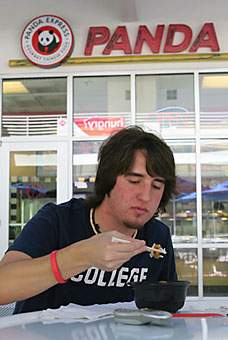 |
|
Josh Fields/Arizona Daily Wildcat
|
Psychology freshman Andrew Apodaca sits down for a meal outside of Panda Express at the Park Student Union yesterday afternoon. The Arizona Board of Regents is considering a $20 student fee as an alternative to a mandatory meal plan.��
|
|
|
By Zach Colick
Arizona Daily Wildcat
August 26, 2005
Print this
Students may have to pay a $20 student union fee next year if regents approve the proposal.
Proposed by the UA Dining Services, the fee would be an alternative to the mandatory meal plan suggested at the end of last semester.
If approved, the fee will expand services, cover maintenance costs, and finance the debt and bonds the Student Union Memorial Center was constructed with, among other intentions, said Dan Adams, director of the Arizona Student Unions, in an e-mail.
Adams said a student union fee requires less of a financial commitment from on-campus students and would create more revenue for the student union to use, whereas the meal plan would generate fractions of every dollar spent on food and labor expenses.
The Residence Hall Association and the three governing greek councils, Interfraternity Council, Panhellenic, and the National Panhellenic councils proposed the idea for the fee at the end of last semester, Adams said.
These student groups comprise more than 8,000 students on the UA campus, and Adams said it made sense to continue a dialogue that examined their recommendations.
"After listening to the rationale put forth by the various student groups across the UA campus, I agree that the fee is the better (choice)," Adams said. "Since both unions' services are used by all students, in their mind it makes more sense to collect a small fee from all students than a much larger amount from on-campus students only."
Adams said greeks favored this idea over a mandatory meal plan because many chapters already have some form of a meal plan, and they expressed concerns that another might unfairly burden their membership.
Student Regent Ben Graff, a third-year law student, said his role as a regent is to observe and look at what kind of impact the student union fee and mandatory meal plan would have at the UA.
The UA is the only school in the Pacific 10 Conference that does not have a mandatory meal plan or a student union fee. The Arizona Board of Regents recently approved the mandate at Arizona State and Northern Arizona universities for a mandatory meal plan.
Graff said he's reached out and communicated with students, RHA and Greek Life in making sure he "gets the pulse of the student body very accurately" on the matter before it ultimately rests in the regents' hands. He said he wouldn't support the fee if students didn't benefit from it or if their best interests weren't met.
"ABOR is very cautious about mandatory fees because a fee of any type adds to the overall price of education," said Graff, adding that regents suspended adding more fees in colleges across the UA in the spring semester to determine whether those fees were pertinent to student's educational experience.
While some student organizations support the plan, others, like the Associated Students of the University of Arizona, are skeptical of whether implementing any fee is necessary.
"Students cannot give the student union a blank check," said ASUA President Cade Bernsen. "If there is to be a fee, the union must implement services that students want, such as healthier eating options."
Bernsen said he has not decided whether he supports the fee because the specifics of the plan have not been laid out, but he said he would not support anything that requires students to pay more and not be compensated.
The student unions, which operate Campus Dining Services, are expected to be primarily self-supporting in generating enough income to cover expenses, including state employee wages, retirement and employee health costs.
Of the $21 million annual budget, Adams said, Campus Dining Services receive about $840,000 from UA administration to assist with the cost of utilities and upkeep of public spaces, while the remaining money comes from all the dining and retail operations around campus.
"As the interest rate continues to climb, so will our debt service payment, which over the next several years will quickly deplete the reserves," Adams said. "Without the identification of a new revenue source, the unions will not have the financial resources to maintain the quality of service to operate sufficiently on the UA campus"
Likewise, Adams said the ability to react to student requests for new services, such as the Highland Market, IQ Fresh or extended student union operation hours, will be greatly reduced if a fee is not implemented.
Currently, all campus fees are refundable to students who choose to go through the process of obtaining a refund, and Adams said he assumes a new student union fee would have the same option.
